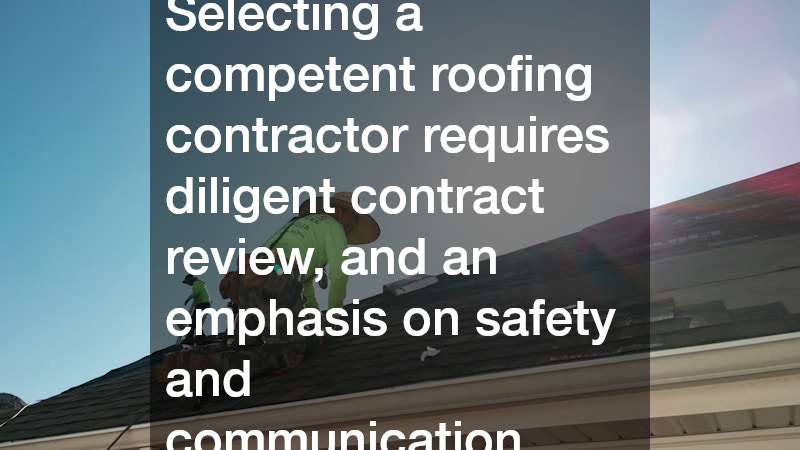Hiring a roofing contractor is a crucial step for any homeowner facing the need for roof repairs or replacement. A well-maintained roof ensures the safety and integrity of your home, shielding it from the elements. However, navigating the process of selecting a qualified roofing contractor can be challenging, with common pitfalls involving reliability, costs, and timelines.
How to Choose the Right Roofing Contractor
Research and Recommendations
Conducting thorough research is the cornerstone of finding an excellent roofing contractor. Start by asking friends, family, and neighbors for recommendations, as personal experiences can offer invaluable insights. Additionally, checking online reviews and ratings will provide a broader perspective on contractors’ reputations and service satisfaction.
Once a list of potential contractors is compiled, delve deeper into their professional background. Explore official websites, scrutinize customer testimonials, and verify ratings on trusted platforms like the Better Business Bureau. Remember, a contractor with a strong online presence and positive reviews tends to show a commitment to customer satisfaction.
Word-of-mouth referrals combined with thorough online research create a solid foundation for decision-making. Make sure to perform a comparative analysis of multiple contractors to narrow down the list. Ultimately, investing time in this initial research phase builds confidence and peace of mind in your contractor selection.
Verifying Credentials and Experience
When selecting a roofing contractor, verifying their credentials is non-negotiable. Ensure that the contractor holds the necessary licenses and certifications required by your state or local jurisdiction. Valid insurance coverage is critical as it protects homeowners from potential liability should accidents occur during the project.
Furthermore, a contractor’s experience is a vital factor to assess their capability in managing your roofing needs. Enquire about their years in business, types of projects handled, and any specialized skills they may possess. Reviewing a portfolio of past projects or requesting client references can provide confirmation of their craftsmanship and reliability.
Transparency in credentials and experience underscores a contractor’s credibility and commitment to high-quality standards. Encourage open discussions about their professional background and industry affiliations. Trust is built on these foundational assurances, paving the way for a successful working relationship.
Interviewing and Asking the Right Questions
Interviewing potential contractors is a pivotal step in the selection process. Prepare a list of essential questions that address your specific roofing needs and project expectations. Key questions should cover topics such as project timelines, cost estimates, warranty provisions, and safety protocols.
In these interviews, clear and concise communication is vital to ensure mutual understanding between you and the contractor. Assess their responsiveness and willingness to answer questions in detail as these are indicators of their professionalism and customer service skills. Asking about their approach to unforeseen challenges provides insight into their problem-solving capabilities.
Choosing a contractor should also be based on comfort level and communication style. Ensure that they fully understand your vision and expectations for the roofing project. A contractor who is both communicative and knowledgeable can greatly enhance your overall project experience.
Understanding Roofing Estimates and Contracts
Components of a Roofing Estimate
Roofing estimates are comprehensive documents that detail the scope and costs associated with your project. It is critical for homeowners to understand these components to make informed decisions. A typical estimate should include materials, labor, project timeline, and contingency plans for unforeseen issues.
Comparing estimates from multiple contractors allows homeowners to evaluate variations in pricing and services offered. Be wary of significant price discrepancies, as extremely low estimates might indicate the use of subpar materials or inexperience. Always strive for a balance between competitive pricing and quality workmanship.
Understanding the intricacies of a roofing estimate equips homeowners with the knowledge to negotiate effectively. Ensure transparency by asking contractors to clarify any ambiguities within their estimates. This proactive approach aids in securing the best possible value for your roofing investment.
Contract Clauses and Terms to Consider
Reviewing a roofing contract meticulously is essential before any work commences. Important clauses to consider include project scope, payment terms, timelines, and warranty details. Pay attention to the termination clauses, as these outline the conditions under which either party can exit the contract.
Ensure that the contract specifies who is responsible for obtaining necessary permits and that it includes a clear description of the materials to be used. Additionally, confirm that the contract states the contractor’s responsibility for cleanup and disposal of debris. Never hesitate to request amendments if any terms seem contradictory or insufficiently protective.
A legally sound contract provides a framework for accountability and dispute resolution. Investing the time to review and understand your contract safeguards your interests and establishes mutual expectations. Trust is solidified when contractual agreements are transparent and mutually agreed upon.
Payment Schedules and Methods
Understanding payment schedules and methods is integral to safeguarding your financial interests during the roofing project. Reputable contractors often do not request full payment upfront; instead, they work with a phased payment system tied to the completion of specific project stages. This approach not only protects homeowners but also incentivizes contractors to uphold agreed timelines and quality standards.
Common payment methods include checks, credit cards, or verified financial transactions; these options provide traceability and security. Always insist on documented receipts for each payment made to maintain an accurate project cost record. Avoid cash payments as they lack the accountability needed for transaction verification.
Maintaining control over the financial aspects ensures peace of mind throughout the project. An agreed-upon payment schedule aligns both parties’ expectations and facilitates smoother project execution. Stay informed and vigilant about payment milestones to mitigate any financial discrepancies or misunderstandings.
Selecting a competent roofing contractor requires thorough research, diligent contract review, and an emphasis on safety and communication. Each phase of the project—from contractor selection to project completion—benefits from proactive planning and informed decision-making. By prioritizing due diligence, homeowners lay the groundwork for a successful roofing project, ensuring both satisfaction and peace of mind.

